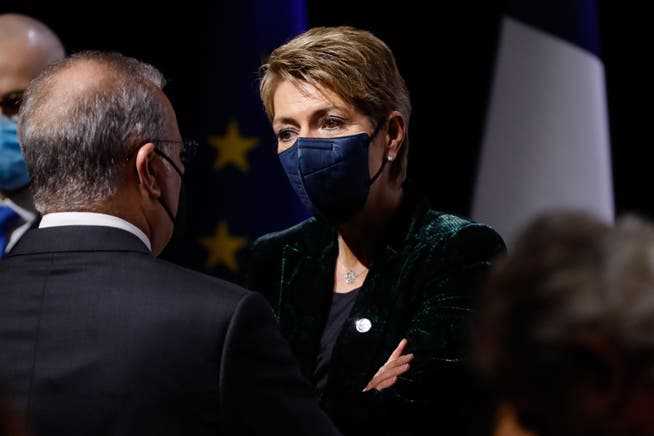All the heads of state and government in the EU are reliably breaking their teeth when it comes to migration policy. Now the French President is trying his luck. His suggestion: A new council of Schengen states should ensure better border protection. Switzerland would also be there.
President Macron explains the idea of a “Schengen Council” to the justice and home affairs ministers of the Schengen area in Lille.
It is rather unusual for a country’s president to show up at a meeting of EU ministers. However, French head of state Emmanuel Macron had his reasons for going to Lille on Wednesday evening, where the justice and interior ministers of the member states and the Schengen area discussed asylum and migration policy. The election campaign is on in France, and when it comes to illegal immigrants, Macron is breathing down both conservative and far-right competitors.
«Face of a strong Europe»
The President also spoke about migration, and in doing so he presented his latest idea to those present: In order to better protect the external borders of the European Union, better ward off illegal migrants and thus be able to restore full freedom of movement internally, the Schengen area should have a new political get corporation. Macron believes that a “Schengen Council” is needed. A council that improves coordination between all Schengen countries and could become the “face of a strong Europe” that is fine with controlling its external borders.
Macron has the Euro Group in mind as a role model. This discussion format was also born out of the crisis and today allows close, binding agreements between the members. In extreme situations, such as the recent crisis with Belarus, the Schengen Council would then trigger its own mechanisms, for example to be able to send help to other countries at short notice.
At the same time, there must be faster procedures for registering migrants at the external border. As early as the beginning of March, at the next meeting of the ministers, Macron said, the new institution could be launched. A change in the EU treaties is not necessary for this.
The Schengen area currently includes 26 countries, including not all EU countries, but Switzerland, Norway and Liechtenstein. The Swiss Federal Councilor Karin Keller-Sutter, responsible for the migration dossier, also traveled to Lille. There she learned personally from Macron that Switzerland and all associated states were “of course” involved in the Schengen Council. However, Keller-Sutter did not want to comment on the specific design of the new institution in a conversation with journalists on Thursday. It is still too early for that, said the Federal Councilor.

Federal Councilor Karin Keller-Sutter during a break in negotiations in Lille.
«Coalition of the Willing» or «Alliance of Reason»?
Macron’s proposals are not entirely new. More efficient asylum procedures and more solidarity between the member states, especially when it comes to the distribution of asylum seekers, have long been part of the EU Commission’s so-called Asylum and Migration Pact. It is not yet clear whether coordination would be easier in a Schengen Council. Still, in Lille, EU refugee commissioner Ylva Johansson was full of praise for the French president.
Federal Councilor Keller-Sutter said on Thursday that there was a consensus to better protect the external borders. What that means in concrete terms, however, is interpreted differently by the countries. In Lille, for example, the Austrian Minister of the Interior, Gerhard Karner, advocated an “alliance of reason”, while Karner’s German counterpart, Nancy Faeser, preferred to uphold the image of a “coalition of the willing”. Germany continues to stand for an open Europe in which legal escape routes must exist, said Faeser. Karner countered that it shouldn’t be about accepting even more refugees in Europe.
